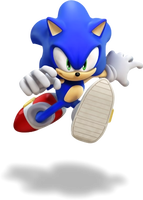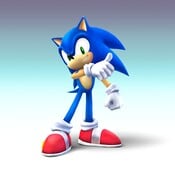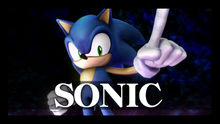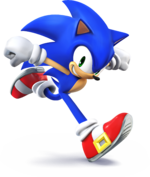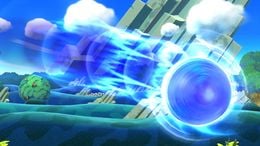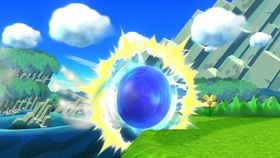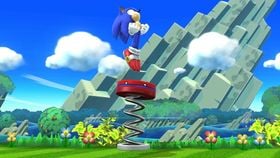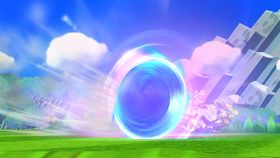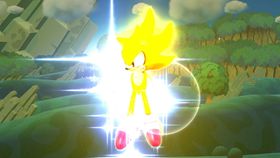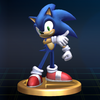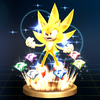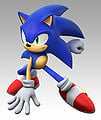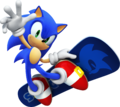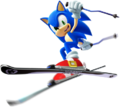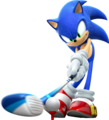Sonic: Difference between revisions
(Undo revision 3133000 by Goombagumba (talk) And your writing is flowery, ergo, the opposite of an improvement.) Tag: Undo |
Goombagumba (talk | contribs) (Undo revision 3133025 by Doc von Schmeltwick (talk) What exactly is your definition of "flowery"? Using adjectives? This is objectively better, clearer writing that improves the quality of the article.) Tag: Undo |
||
| Line 7: | Line 7: | ||
{{quote2|Sonic's the name, speed's my game!|Sonic|[[Super Smash Bros. Brawl]]}} | {{quote2|Sonic's the name, speed's my game!|Sonic|[[Super Smash Bros. Brawl]]}} | ||
'''Sonic the Hedgehog''' is the eponymous main protagonist of the ''{{wp|Sonic the Hedgehog}}'' video game franchise | '''Sonic the Hedgehog''' is the eponymous main protagonist of the ''{{wp|Sonic the Hedgehog}}'' video game franchise. He's been the [[Sega|Sega Corporation's]] official mascot since June 23, 1991, when he replaced their previous mascot, Alex Kidd. Though Sonic's most iconic games have been 2-D and 3-D platformers, he has also appeared in a large variety of sports, racing, and party games as well. | ||
Since the beginning of his series, Sonic has been portrayed as a champion of peace, risking his life to stop the evil schemes of a variety of violent foes, particularly [[Dr. Eggman]]. His trademark power is an ability to run at supersonic speed, hence his name. He is generally portrayed as a heroic and headstrong character, with a bit of a tendency towards cockiness and recklessness. Sonic is often aided in his adventures by a vast number of other animal characters, most commonly his close friends [[Miles "Tails" Prower]], [[Knuckles the Echidna]], [[Amy Rose]], and [[Shadow the Hedgehog]]. | Since the beginning of his series, Sonic has been portrayed as a champion of peace, risking his life to stop the evil schemes of a variety of violent foes, particularly [[Dr. Eggman]]. His trademark power is an ability to run at supersonic speed, hence his name. He is generally portrayed as a heroic and headstrong character, with a bit of a tendency towards cockiness and recklessness. Sonic is often aided in his adventures by a vast number of other animal characters, most commonly his close friends [[Miles "Tails" Prower]], [[Knuckles the Echidna]], [[Amy Rose]], and [[Shadow the Hedgehog]]. | ||
During the 1990s, Sonic was understood to be "Sega's answer to [[Mario]]," and the two characters symbolized what was a then-intense rivalry between the world's two leading producers of home video game entertainment. In 2001 Sega officially quit the hardware business and soon began making games for Nintendo platforms. In 2007 Sonic and Mario appeared in a game together for the first time, [[Mario & Sonic at the Olympic Games]], in what was considered a highly symbolic moment in gaming history. Since then, there have been many more entries in the [[Mario & Sonic (series)|''Mario & Sonic'' series]] and the two characters have also appeared side-by-side in the [[Super Smash Bros. (series)|''Super Smash Bros.'' series]]. | |||
For the first two ''Mario & Sonic'' games and ''Super Smash Bros. Brawl'', Sonic was voiced in English by [[sonicretro:Jason Griffith|Jason Griffith]], his at-the-time current voice actor in the ''Sonic the Hedgehog'' series. For the next four ''Mario & Sonic'' games as well as ''Super Smash Bros. for Nintendo 3DS / Wii U'' and ''Super Smash Bros. Ultimate'', [[sonicretro:Roger Craig Smith|Roger Craig Smith]] succeeded Griffith as Sonic's English voice since the release of ''[[sonicretro:Sonic Free Riders|Sonic Free Riders]]'' and ''[[sonicretro:Sonic Colors|Sonic Colors]]'' in 2010 until ''Puyo Puyo Tetris 2'' in 2021. In 2021, Smith departed from the role of Sonic. Unlike Mario, Sonic usually has full voice acting. | For the first two ''Mario & Sonic'' games and ''Super Smash Bros. Brawl'', Sonic was voiced in English by [[sonicretro:Jason Griffith|Jason Griffith]], his at-the-time current voice actor in the ''Sonic the Hedgehog'' series. For the next four ''Mario & Sonic'' games as well as ''Super Smash Bros. for Nintendo 3DS / Wii U'' and ''Super Smash Bros. Ultimate'', [[sonicretro:Roger Craig Smith|Roger Craig Smith]] succeeded Griffith as Sonic's English voice since the release of ''[[sonicretro:Sonic Free Riders|Sonic Free Riders]]'' and ''[[sonicretro:Sonic Colors|Sonic Colors]]'' in 2010 until ''Puyo Puyo Tetris 2'' in 2021. In 2021, Smith departed from the role of Sonic. Unlike Mario, Sonic usually has full voice acting. | ||
==Concept and creation== | ==Concept and creation== | ||
In April of 1990, Sega requested a game that would be capable of selling at least | In April of 1990, Sega requested a game that would be capable of selling at least a million copies, compete against Nintendo's "Mario" franchise, and replace their current mascot character, Alex Kidd. Several character designs were submitted, and Sega eventually settled on spiky teal hedgehog submitted by Naoto Oshima named "Mr. Needlemouse" — later renamed Sonic. | ||
Some of the original ideas for Sonic depicted him as being in a band, as well as having a human girlfriend named Madonna who would have played a similar role to [[Princess Peach]] in ''[[Super Mario Bros.]]'', though these were scrapped during development. After a few minor adjustments and redesigning, Sonic Team developed the character's first game, ''Sonic the Hedgehog'' series, a platformer for the Sega Genesis. | |||
==Rivalry== | ==Rivalry== | ||
Nintendo and Sega were business rivals throughout the 1990's, | Nintendo and Sega were fierce business rivals throughout the 1990's, with the most heated period occurring during the era that pitted the [[Super Nintendo Entertainment System]] against the [[wikipedia:Sega Genesis|Sega Genesis / Mega Drive]]. As the mascots of the respective companies, Mario and Sonic were often used to symbolically represent the conflict in advertisements, fan works, and occasionally the games themselves. A few titles from the era include snide insults, such as Sonic's shoes appearing beside a trashcan labeled "NO HOPERS" in ''[[Donkey Kong Country 2: Diddy's Kong Quest]]'', and possibly the [[Harry Hedgehog]] characters of ''[[Super Mario World 2: Yoshi's Island]]''. 'Mario in, turn was mocked on the back of the box of the original ''Sonic the Hedgehog'' for the Genesis, which contains constant use of the word "super" — which had been the trademark prefix of the Mario franchise since [[Super Mario Bros.]] as well as in the form of "the Marxio Brothers" in ''Sonic the Comic'', a British comic book about Sonic and his friends. | ||
The rivalry formally ended in 2001 when Sega left the console manufacturing market with the discontinuation of their last console, the [[wikipedia:Dreamcast|Dreamcast]] (in America and Europe), instead becoming a third-party software developer. The first Sonic games to appear on a Nintendo system were ''Sonic Advance'' (2001) for [[Game Boy Advance]] and an enhanced port of ''Sonic Adventure 2'' for the [[Nintendo GameCube]], titled ''Sonic Adventure 2: Battle'' (2002). Both were released simultaneously in Japan. | |||
The biggest symbolic moment came in 2007, however, when Mario and Sonic appeared in a game together for the first time, [[Mario & Sonic at the Olympic Games]], which IGN [https://www.ign.com/articles/2007/03/29/mario-sonic-at-the-olympic-games-interview called] the gaming equivalent of a "historic peace treaty." [[Mario and Sonic]] proceeded to become a successful series of sporting games in which the worlds of the two franchises briefly combined, with characters from both series' playing against each other in real-world sporting events. | |||
==History== | ==History== | ||
| Line 608: | Line 614: | ||
*''"Let's do that again sometime!"'' - ''Super Smash Bros. for Nintendo 3DS'' / ''Wii U'' | *''"Let's do that again sometime!"'' - ''Super Smash Bros. for Nintendo 3DS'' / ''Wii U'' | ||
*''"Piece of cake!"'' - ''Super Smash Bros. for Nintendo 3DS'' / ''Wii U'' | *''"Piece of cake!"'' - ''Super Smash Bros. for Nintendo 3DS'' / ''Wii U'' | ||
===Audio samples=== | ===Audio samples=== | ||
Revision as of 08:46, February 13, 2021
Template:Character-infobox Template:Quote2
Sonic the Hedgehog is the eponymous main protagonist of the Sonic the Hedgehog video game franchise. He's been the Sega Corporation's official mascot since June 23, 1991, when he replaced their previous mascot, Alex Kidd. Though Sonic's most iconic games have been 2-D and 3-D platformers, he has also appeared in a large variety of sports, racing, and party games as well.
Since the beginning of his series, Sonic has been portrayed as a champion of peace, risking his life to stop the evil schemes of a variety of violent foes, particularly Dr. Eggman. His trademark power is an ability to run at supersonic speed, hence his name. He is generally portrayed as a heroic and headstrong character, with a bit of a tendency towards cockiness and recklessness. Sonic is often aided in his adventures by a vast number of other animal characters, most commonly his close friends Miles "Tails" Prower, Knuckles the Echidna, Amy Rose, and Shadow the Hedgehog.
During the 1990s, Sonic was understood to be "Sega's answer to Mario," and the two characters symbolized what was a then-intense rivalry between the world's two leading producers of home video game entertainment. In 2001 Sega officially quit the hardware business and soon began making games for Nintendo platforms. In 2007 Sonic and Mario appeared in a game together for the first time, Mario & Sonic at the Olympic Games, in what was considered a highly symbolic moment in gaming history. Since then, there have been many more entries in the Mario & Sonic series and the two characters have also appeared side-by-side in the Super Smash Bros. series.
For the first two Mario & Sonic games and Super Smash Bros. Brawl, Sonic was voiced in English by Jason Griffith, his at-the-time current voice actor in the Sonic the Hedgehog series. For the next four Mario & Sonic games as well as Super Smash Bros. for Nintendo 3DS / Wii U and Super Smash Bros. Ultimate, Roger Craig Smith succeeded Griffith as Sonic's English voice since the release of Sonic Free Riders and Sonic Colors in 2010 until Puyo Puyo Tetris 2 in 2021. In 2021, Smith departed from the role of Sonic. Unlike Mario, Sonic usually has full voice acting.
Concept and creation
In April of 1990, Sega requested a game that would be capable of selling at least a million copies, compete against Nintendo's "Mario" franchise, and replace their current mascot character, Alex Kidd. Several character designs were submitted, and Sega eventually settled on spiky teal hedgehog submitted by Naoto Oshima named "Mr. Needlemouse" — later renamed Sonic.
Some of the original ideas for Sonic depicted him as being in a band, as well as having a human girlfriend named Madonna who would have played a similar role to Princess Peach in Super Mario Bros., though these were scrapped during development. After a few minor adjustments and redesigning, Sonic Team developed the character's first game, Sonic the Hedgehog series, a platformer for the Sega Genesis.
Rivalry
Nintendo and Sega were fierce business rivals throughout the 1990's, with the most heated period occurring during the era that pitted the Super Nintendo Entertainment System against the Sega Genesis / Mega Drive. As the mascots of the respective companies, Mario and Sonic were often used to symbolically represent the conflict in advertisements, fan works, and occasionally the games themselves. A few titles from the era include snide insults, such as Sonic's shoes appearing beside a trashcan labeled "NO HOPERS" in Donkey Kong Country 2: Diddy's Kong Quest, and possibly the Harry Hedgehog characters of Super Mario World 2: Yoshi's Island. 'Mario in, turn was mocked on the back of the box of the original Sonic the Hedgehog for the Genesis, which contains constant use of the word "super" — which had been the trademark prefix of the Mario franchise since Super Mario Bros. as well as in the form of "the Marxio Brothers" in Sonic the Comic, a British comic book about Sonic and his friends.
The rivalry formally ended in 2001 when Sega left the console manufacturing market with the discontinuation of their last console, the Dreamcast (in America and Europe), instead becoming a third-party software developer. The first Sonic games to appear on a Nintendo system were Sonic Advance (2001) for Game Boy Advance and an enhanced port of Sonic Adventure 2 for the Nintendo GameCube, titled Sonic Adventure 2: Battle (2002). Both were released simultaneously in Japan.
The biggest symbolic moment came in 2007, however, when Mario and Sonic appeared in a game together for the first time, Mario & Sonic at the Olympic Games, which IGN called the gaming equivalent of a "historic peace treaty." Mario and Sonic proceeded to become a successful series of sporting games in which the worlds of the two franchises briefly combined, with characters from both series' playing against each other in real-world sporting events.
History
Donkey Kong Country 2: Diddy's Kong Quest
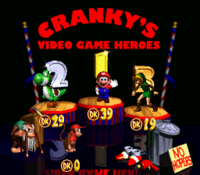
In the Cranky's Video Game Heroes awards ceremony in Donkey Kong Country 2: Diddy's Kong Quest, Sonic's shoes and Earthworm Jim's plasma gun can be seen next to a trash can, along with a sign saying "No Hopers." This detail was removed for the Game Boy Advance port, released after Sega became a third-party.
Mario & Sonic series
Mario & Sonic at the Olympic Games
- “Mario and Sonic have been respectful rivals since the early days of video games. In fact, for a long time they have been discussing the possibility of one day competing against each other. Now that they have been given the perfect opportunity to meet at the Olympic Games, we may finally learn who is actually faster, Mario or Sonic?”
- —Shigeru Miyamoto
Sonic competes against Mario and others in Olympic events in the game Mario & Sonic at the Olympic Games. He is a Speed character, meaning he has great speed, but low power. Sonic wears a yellow life jacket during the swimming events, since he can't swim; however, he moves quite fast in water as well as out of it.
Mario & Sonic at the Olympic Winter Games
Sonic, once again, crosses over with Mario in Mario & Sonic at the Olympic Winter Games. As in Mario & Sonic at the Olympic Games, he is a Speed type character and is the fastest one in the game. In the Adventure Tours mode for the DS version, Bowser and Dr. Eggman team up to ruin the 2010 Olympics. Bowser melts all of the snow at the event, and Dr. Eggman kidnaps the snow spirits to prevent any snowfall. Sonic and Mario team up in order to put a stop to Bowser and Dr. Eggman's plans and to save the snow spirits.
Mario & Sonic at the London 2012 Olympic Games
Sonic appears as a Speed type playable character in the Wii version of Mario & Sonic at the London 2012 Olympic Games, and appears in the game's opening at the beginning with the other athletes, as well as later competing in 110m Hurdles, Dream Hurdles and Dream Uneven Bars, as well as with Mario on top of Big Ben. Sonic appears as a character that can be spoken to in London Party mode in order to play minigames and earn stickers, and Mii outfits based on him and his Super Sonic form can be unlocked.
In the Nintendo 3DS version, Sonic is included in the Heroes group, meaning that he is only playable in certain events. In the Story Mode, Sonic arrives in London with Tails, where they find and clear up the red Phantasmal Fog at the Tower of London, concluding that Bowser is involved. The next day, Sonic and Tails head to Tower Bridge, where they find more Phantasmal Fog, and clear it up with the help of Yoshi, Shadow, Silver and Jet, fiding out from Bowser Jr. that Dr. Eggman is also partially responsible for the fog in the process. Sonic and Tails then move on to the British Museum, where they team up with Mario, Luigi and Toad to clear the fog from the area and find out more about the fog. After gaining some more information, the group splits up, and Sonic heads to Horse Guards Parade, where he finds Knuckles and Vector who help him fend off Bowser and clear the area of fog. Sonic then returns to the Main Stadium to meet up with the others, and helps save Cream and Cheese from some Fog Imposters when the fog returns. Sonic then heads to Stonehenge with Mario, Luigi, Toad, Tails and Omega, where he defeats Magikoopa in an Event, and after Omega recovers some memory, the group head to Big Ben to confront Bowser and Dr. Eggman. Toad and Omega head back to the Main Stadium, and the remaining four confront Bowser and Dr. Eggman, with Mario and Sonic challenging the pair. When they are defeated, Sonic helps Mario seal away the Phantasmal Fog, and then accompanies Bowser and Dr. Eggman to the Main Stadium so that they can sign up for the games, and later appears at the opening ceremony. A badge of Sonic can also be obtained from the badge machine.
Mario & Sonic at the Sochi 2014 Olympic Winter Games
Sonic also appears as a playable character in Mario & Sonic at the Sochi 2014 Olympic Winter Games. He is once again a Speed type character.
Mario & Sonic at the Rio 2016 Olympic Games
Sonic returns as a playable Speed type character in Mario & Sonic at the Rio 2016 Olympic Games. In the 3DS version, Sonic, along with Mario, can be used in any of the game's events. This is the first Nintendo 3DS Mario & Sonic game to give Sonic in-game text dialogue, as opposed to his silence in previous games.
Mario & Sonic at the Olympic Games Tokyo 2020
Sonic reappears in Mario & Sonic at the Olympic Games Tokyo 2020 as a playable Speed type character. Like many other characters in the game, Sonic wears appropriate clothing depending on the event. He is one of the eight characters that are playable in 2D Events. In the game's Story Mode, Sonic gets sucked into a game system along with Mario, Toad, Bowser and Dr. Eggman, and decides to compete in the Tokyo 1964 Olympic Games.
Super Smash Bros. series
Super Smash Bros. Brawl
Template:Main-external Sonic is an unlockable playable character in Super Smash Bros. Brawl, and, alongside Solid Snake, is one of the first two non-Nintendo characters to appear as playable characters in the series. He can be unlocked by playing 300 Brawl matches, completing Classic with ten characters, playing ten hours of Brawl matches, or by having Sonic join the party in The Subspace Emissary; with any of the first three methods, the player must then defeat Sonic on Green Hill Zone. Sonic was not originally planned to appear; he was included during development in 2007, making him the final character created from the ground up to be added into the game.[1]
Sonic is the fastest character in the game, with fast attacks and movements. Several of Sonic's moves are based on those he uses in his games. His standard special is the Homing Attack, which involves him flying right into opponents, his down special and side special are Spin Dash and Spin Charge, respectively, which both involve him curling into a ball and ramming into opponents, and his up special is Spring Jump, which involves him leaping up off of a spring from the Sonic series. His Final Smash move is using the Chaos Emeralds to transform into Super Sonic, allowing him to fly around the stage to attack.
Sonic's victory theme is directly taken from the 2006 Sonic the Hedgehog game, that tune being an arrangement of the "Act clear" theme from Sonic the Hedgehog 3 and most Sonic games after that. This makes him the first character in the series whose victory theme is ported directly from a non-Super Smash Bros. game.
The Subspace Emissary
Sonic does not appear in the Subspace Emissary until the very end, after The Great Maze. As every fighter makes it to where Tabuu resides, he prepares his Off Waves, which would have turned every character into a trophy. As soon as he's about to release the attack, a blue blur dashes past the fighters, and rams into both of Tabuu's wings, causing the Off-Wave attack to fail. As the blue blur jumps up on a "peak", he reveals himself to be Sonic. While he taunts, Tabuu's wings break apart, and then six fighters are selected to fight Tabuu in the final battle. Sonic, along with Jigglypuff, Squirtle, Toon Link, Wolf O'Donnell, and Zero Suit Samus, is one of the only characters that are never seen as trophies in The Subspace Emissary.
Super Smash Bros. for Nintendo 3DS / Wii U
Template:Main-external Sonic reappears in Super Smash Bros. for Nintendo 3DS and Super Smash Bros. for Wii U as a playable character–making him the first third-party veteran fighter. This time, however, he is available from the start. He is also now voiced by Roger Craig Smith in English instead of Jason Griffith; additionally, he is now voiced by a different voice actor in different regions (e.g. he has a French voice in France). However, his voice clips are recycled voice clips from other games, with his voice clips of rising from water (only in the Wii U version), sleeping, and one of his attack grunts being archival recordings of Jason Griffith from Super Smash Bros. Brawl. His appearance has been updated to reflect his design in his more recent games such as Sonic Colors, which in turn are based on official 2D and CG artworks.
His moveset is almost completely unchanged from Super Smash Bros. Brawl; the only real changes are that his down smash from the previous game (a back-and-forth Spin Dash) has been replaced with a split-kick, while his dash attack (a Spin Dash) has him perform a lunging kick afterwards. Sonic's overall damage output is lowered, but many of his attacks deal more knockback. Sonic's air speed and fast-falling speeds are both faster, while his walking speed is slightly slower.
One of his alternate colors in this game seems to be based off Silver the Hedgehog. Along with Sonic himself, a stage based on Windy Hill Zone from Sonic Lost World makes an appearance in Super Smash Bros. for Wii U as well as the returning Green Hill Zone appearing in Super Smash Bros. for Nintendo 3DS.
Super Smash Bros. Ultimate
Template:Main-external Sonic returns as a playable character in Super Smash Bros. Ultimate. Like Super Smash Bros. Brawl, Sonic is an unlockable character instead of being available from the start. Sonic's basic moveset appears mostly unchanged aside from his dash attack, which is now solely a lunge kick. His Final Smash, Super Sonic, returns, but he travels much faster than before, and he moves automatically back and forth while his height can be adjusted, in a vein similar to Pac-Man's Final Smash. As with several other returning characters, Sonic's victory theme has been slightly shortened compared to the previous installments. Both Green Hill Zone from Super Smash Bros. Brawl and Windy Hill Zone from Super Smash Bros. for Wii U return as well.
Like all other characters in the game, Sonic receives benefits from universal changes: his already quick mobility is much faster; his aerial attacks have less landing lag; his short hop timing is reduced; he can directionally air dodge to aid his recovery; and he can use any grounded attack out of a run and any of his aerial attacks while climbing ladders. In a similar vein to fellow veteran Charizard and newcomers Inkling and Incineroar, Sonic takes minor damage from swimming in water; this is due to him being unable to swim in his home games.
In the World of Light trailer, Sonic tries to run away from Galeem's large laser attack, but slows down in an attempt to save Pikachu; this fails, with both of them being captured by Galeem and used to create puppet fighters. Sonic is found in the "Sacred Land" sub-area of the Dark Realm, and is one of the fighters required to be defeated to progress.
Classic Mode route
In his Classic Mode route, Sonic battles against fighters based on various characters he encounters throughout the Sonic franchise.
| At the Speed of Sound | ||||
|---|---|---|---|---|
| Round | Opponent(s) | Stage | Song | |
| 1 | Fox | Green Hill Zone | Green Hill Zone | |
| 2 | Captain Falcon | Figure-8 Circuit | Super Sonic Racing | |
| 3 | Giant Metal Sonic | Fourside (Ω) | Open Your Heart | |
| 4 | Kirby ×3 | Halberd | Sonic Heroes | |
| 5 | Sheik | Mushroomy Kingdom | Seven Rings in Hand | |
| 6 | Giant Incineroar | Windy Hill Zone | Wonder World | |
| Final | Master Hand, Crazy Hand (intensity 7.0 or higher) | Final Destination | Master Hand Master Hand / Crazy Hand (intensity 7.0 or higher) | |
Special moves
Homing Attack
Template:Main-external The Homing Attack is one of Sonic's moves appearing in most games in his series since Sonic Adventure, and his standard special move in the Super Smash Bros. series. When used, Sonic curls up into a ball and hovers in the air before charging down and forward, hitting any nearby opponents. The player can also have Sonic immediately charge forward by pressing the special attack button again, though the move is weaker as a result. The Homing Attack causes Sonic to bounce off of the opponents if it hits, in addition to walls and the ground if it misses.
In Super Smash Bros. Ultimate, crosshairs briefly appear on Sonic's target when the Homing Attack is used. The move is also used by Knuckles when he is summoned from an Assist Trophy.
In Super Smash Bros. for Nintendo 3DS / Wii U, the Homing Attack is given two custom variants. The first is Stomp, another move from the Sonic the Hedgehog series that causes Sonic to slam directly downward into opponents and meteor smash them. The second move is Surprise Attack, which is faster, but Sonic stays in place while charging and the attack sends Sonic into the air a little, giving the move less range.
- Names in other languages
| Language | Name | Meaning | Notes |
|---|---|---|---|
| Japanese | ホーミングアタック[?] Hōmingu Atakku |
Homing Attack | |
| French | Attaque téléguidée[?] | - | |
| German | Verfolgungsangriff[?] | Pursuit attack | |
| Italian | Attaco a ricerca[?] | Attack to research | |
| Spanish | Ataque teledirigido[?] | - |
The Homing Attack in Super Smash Bros. Brawl
Spin Dash
Template:Main-external The Spin Dash is Sonic's side special move, based on the move that he has had in the Sonic the Hedgehog series since Sonic the Hedgehog 2. Rather than rapidly pressing the button like in the Sonic games, the Spin Dash in the Super Smash Bros. series instead charges by holding down the special attack button. Sonic curls up into a ball as the move charges, and when the button is released Sonic charges forward, damaging any enemies in his path while doing a small hop at the beginning. The player can change the direction of the dash by tilting the control stick in the other direction. Players can also jump while dashing by pressing any button.
In Super Smash Bros. for Nintendo 3DS / Wii U, the Spin Dash has two custom variants that can be unlocked: Hammer Spin Dash and Burning Spin Dash. Hammer Spin Dash causes Sonic to leap into the air and slam the ground upon dashing, burying any opponents beneath him, though the move does not have as much attack power. Burning Spin Dash has a fire effect, but does not have the hop at the beginning of the move.
- Names in other languages
| Language | Name | Meaning | Notes |
|---|---|---|---|
| Japanese | スピンダッシュ[?] Supin Dasshu |
Spin Dash | |
| French | Course tourbillon[?] | Whirlwind race | |
| German | Wirbelsprint[?] | Vortex sprint | |
| Italian | Scatto avvitato[?] | - | |
| Spanish | Torbellino[?] | Whirlwind |
Spring Jump
Template:Main-external Spring Jump is Sonic's up special move. When used, Sonic summons a Spring from the Sonic the Hedgehog series underneath him and uses it to bounce upwards. He can use this both on the ground and in mid-air. If he uses it on the ground, it stays in place for a while, allowing him and other characters to bounce on it as well. Sonic cannot do damage when using the spring; however, he can still use his aerial moves (but no special moves) afterwards (one of very few up special moves that can do so). When the spring falls in midair and hits an opponent, it sends them straight downwards and deals some minor damage. Sonic can also use this move to recover from getting knocked off the edge of a stage.
In Super Smash Bros. for Nintendo 3DS / Wii U, Spring Jump has two custom variants: Double Spring and Springing Headbutt. Double Spring allows Sonic to summon another spring in mid-air after using the first, but reduces the jump height to compensate. Springing Headbutt causes Sonic to attack on the initial jump, but the spring disappears when it touches the ground and the jump is also slightly lower.
- Names in other languages
| Language | Name | Meaning | Notes |
|---|---|---|---|
| Japanese | スプリングジャンプ[?] Supuringu Janpu |
Spring Jump | |
| French | Saut propulsé[?] | Propelled jump | |
| German | Sprungfeder[?] | Spring | |
| Italian | Salto a molla[?] | - | |
| Spanish (NOA) | Salto del resorte[?] | - | |
| Spanish (NOE) | Salto del muelle[?] | - |
Spin Charge
Template:Main-external The Spin Charge is Sonic's down special move. It is a Sonic technique that originated from Sonic the Hedgehog 2. The attack is very similar to the Spin Dash, but it has the potential to move faster. If Sonic uses this attack, the player must tap the special move button repeatedly to charge the attack even further. It also lacks a hop at the start, unlike Spin Dash. Charging it up gives it a huge power and speed boost, more so than the Spin Dash's charge. When the player taps the special move button but does not keep tapping it, Sonic will stop spinning, which could fake out the opponents. The attack is also very similar to Jigglypuff's Rollout attack.
In Super Smash Bros. for Nintendo 3DS / Wii U, the Spin Charge has two custom variants: Auto-Spin Charge and Gravitational Charge. Auto-Spin Charge removes the need of tapping the B button repeatedly for it to charge. Gravitational Charge pulls opponents in front of Sonic and towards him, then pushes them behind him and away from him.
- Names in other languages
| Language | Name | Meaning | Notes |
|---|---|---|---|
| Japanese | スピンチャージ[?] Supin Chāji |
Spin Charge | |
| French | Amorce tourbillon[?] | Whirlwind primer | |
| German | Wirbelladung[?] | Vortex charge | |
| Italian | Carica avvitante[?] | - | |
| Spanish | Carga torbellino[?] | Whirlwind charge |
Final Smash
Super Sonic
- “Super Sonic style!”
- —Sonic the Hedgehog, Super Smash Bros. for Nintendo 3DS / Wii U
Super Sonic is a form that is taken by Sonic when he collects the seven Chaos Emeralds that appears in many installments in the Sonic the Hedgehog series, first appearing in Sonic the Hedgehog 2, and also appears as his Final Smash. When activated, the Chaos Emeralds appear around Sonic and transform him into Super Sonic, allowing him to freely fly around at high speed, ramming into opponents to deal damage. After some time, the transformation ends and Sonic returns to normal. The player cannot self-destruct while using this Final Smash, as Super Sonic cannot fly past the stage's blast lines.
In Super Smash Bros. Ultimate, the Final Smash is now automatic, and instead has Super Sonic flying rapidly across the screen multiple times, damaging anyone he hits; however, his height can still be adjusted.
- Names in other languages
| Language | Name | Meaning | Notes |
|---|---|---|---|
| Japanese | スーパーソニック[?] Sūpā Sonikku |
Super Sonic | |
| French | Super Sonic[?] | - | |
| German | Super Sonic[?] | - | |
| Italian | Super Sonic[?] | - | |
| Spanish | Super Sonic[?] | - |
Mario Kart 8 / Mario Kart 8 Deluxe
The artwork of Sonic from Mario & Sonic at the Olympic Winter Games is seen on the Mii Racing Suits screen of Mario Kart 8 and Mario Kart 8 Deluxe. Upon scanning the Sonic amiibo onto the NFC Touchpoint, a racing suit stylized after him will be accessible to the player; this suit can be used on the Mii.
Yoshi's Woolly World / Poochy & Yoshi's Woolly World
By tapping Sonic's amiibo into Yoshi's Woolly World and Poochy & Yoshi's Woolly World, the player will unlock a Yoshi appearance based off of Sonic, sporting blue skin with flesh-colored arms and chest, Sonic's shoes and gloves, and green eyes. Tapping in the amiibo will cause Yoshi to transform into this appearance instantly, although it can be switched to at the amiibo Hut as long as it has already been used.
Super Mario Maker
Sonic the Hedgehog appears as one of the Mystery Mushroom costumes available in Super Mario Maker. The costume can be unlocked by clearing 100-Mario Challenge on Expert difficulty or by tapping Sonic's amiibo onto the Wii U GamePad, and can only be used with the Super Mario Bros. style. The sprite used for Sonic is 16-bit, being based on his sprites in the original Sega Genesis / Mega Drive Sonic the Hedgehog game; this makes it the only costume in the game to not be 8-bit. Collecting the Mystery Mushroom giving the player this costume plays the 1-Up tune from the 1991 game Sonic the Hedgehog, and all of Sonic's sound effects are taken from the original games. Pressing ![]() causes Sonic to look up while playing the Ring-collecting sound. Finally, Sonic's "course clear" and "lose a life" fanfare are the course clear and game over fanfare, respectively, from Sonic the Hedgehog 3.
causes Sonic to look up while playing the Ring-collecting sound. Finally, Sonic's "course clear" and "lose a life" fanfare are the course clear and game over fanfare, respectively, from Sonic the Hedgehog 3.
Crossover game appearances
Profiles and statistics
Mario & Sonic at the Olympic Games
Profile
The fastest hedgehog in the world, this little blue speed demon often gets going so fast, he appears to be just a whirling blur. He'll usually be found in front of any of the speed-based events in these Olympic Games, and will be very difficult to catch in any of the short-distance sprints.
Stats
| Icon | Type | Statistics | Emblem |
|---|---|---|---|
| Speed | Template:M&Sstat | 
|
Mario & Sonic at the Olympic Winter Games
Profile
Sonic the Hedgehog is a blue hedgehog that moves at Sonic speed who joins Mario as they go head-to-head at the Olympic Winter Games! Armed with his signature attitude and Spin Dash ability on the Wii and DS, and Jump Dash ability on the DS, Sonic brings a new level of competition to the Olympic Winter Games as his team goes for gold in Vancouver!
Wii statistics
| Icon | Type | Statistics | Special Skill | Emblem |
|---|---|---|---|---|

|
Speed | Template:WinterGames-WiiStat | Spin Dash |
DS statistics
| Icon | Type | Statistics | Special Skill | Emblem |
|---|---|---|---|---|
| Speed | Template:WinterGames-DSStat | Spin Dash |
Mario & Sonic at the Olympic Games Tokyo 2020
Website bio
The world's fastest hedgehog. He can be impulsive and impatient, but he is driven by kindness and a strong sense of justice.
Super Smash Bros. series
Super Smash Bros. Brawl
Trophies
Stickers
Snake's codec
- Snake: ...
- Otacon: Snake, what is it?
- Snake: Something about that hedgehog rubs me the wrong way...
- Otacon: ...? Oh, you mean Sonic the Hedgehog? But everyone loves Sonic. He's a big star. Do you have any idea how excited people are that he's here in Brawl?
- Snake: Yeah, I know, but there's something about him I just don't like.
- Otacon: But...why? You must have some kind of reason.
- Snake: ...Nope, just don't like him.
Super Smash Bros. for Nintendo 3DS / Wii U trophies
| Name | 3DS Image | Wii U Image | Appears in | American English description | British English description |
|---|---|---|---|---|---|
| Sonic the Hedgehog Sonic |
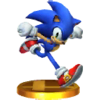
|
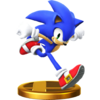
|
Sonic The Hedgehog (06/1991) Wii U Sonic Lost World (10/2013) |
The main star of the Sonic the Hedgehog series. He's an easygoing hedgehog who blows past the competition with his speed. Seriously, on the ground he's faster than anyone else in Smash Bros. Use this to your advantage, avoiding blows while landing lightning-fast attacks. | A certain hedgehog from a certain series you just might have heard of. Unlike most hedgehogs, he's incredibly fast. Like most hedgehogs, however, he can't swim. He's by far the fastest runner of all the fighters, so take advantage of that by making sure no one gets the chance to hit him. (Just try not to end up in the water.) |
| The star of the Sonic The Hedgehog series. He's an easygoing hedgehog who blows past the competition with his speed. Seriously, on the ground he's faster than anyone else in Smash Bros. Use this to your advantage, avoiding blows while landing lightning-fast attacks. | |||||
| Sonic (Alt.) | 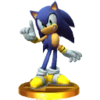
|
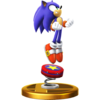
|
Sonic The Hedgehog (06/1991) Wii U Sonic Lost World (10/2013) |
Sonic's up special Spring Jump lets him reach great heights by jumping on a spring, becoming invincible for a moment. He can't use any other specials during the jump, but he can attack or dodge. This move's great for returning from a long launch. Other fighters can use the spring, though! | Sonic's Spring Jump up special lets you bounce to great heights and briefly makes you invincible at the start. You can't use other specials while in the air, but you can use normal attacks, dodge and so on. It's great for getting both back to the stage and out of tough spots, but just remember that everyone else can use the spring too! |
| Super Sonic | N/A | 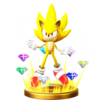
|
The Chaos Emeralds are said to hold enough power to control the whole world. It's that power that turns Sonic into Super Sonic. He turns a glorious golden color and can fly at nearly the speed of light. In his Final Smash, this high-speed flight damages anyone who gets in its way and can even launch them! | ||
Red indicates exclusive to the Nintendo 3DS version.
Blue indicates exclusive to the Wii U version.
Super Smash Bros. Ultimate spirit
| Name | Image | Game | Type | Class | Effect | How to obtain | Spirit battle | |||
|---|---|---|---|---|---|---|---|---|---|---|
| Opponents | Battle conditions | Stage | Song | |||||||
| Super Sonic | 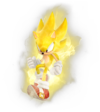
|
Sonic the Hedgehog Series | Primary (3) | Legend | limegreen Speed ↑ |
Spirit Board | Gold Sonic | Rule: Sudden Final Smash
|
Windy Hill Zone | Live & Learn |
Palutena's Guidance
- Pit: For being a hedgehog, Sonic really isn't very spiky, is he?
- Viridi: Yeah, I've seen spikier. It's true that you're more likely to find him curled up in a cute, harmless ball.
- Palutena: Not so harmless. That round shape lets him Spin Dash with ease.
- Pit: I've changed my mind. He's entirely too spiky.
- Viridi: Spin Dashes are hard to stop, though.
- Palutena: Just keep your cool and don't lose focus. You can stop Spin Attacks using your Orbitars or Bow.
amiibo
- Sonic the Hedgehog is the fastest hero in the world, famous for his supersonic speed, iconic blue spikes and red shoes. With a super cool attitude and easy-going demeanor, Sonic has a love for freedom and adventure. Spinning head-on into trouble to defeat the evil forces of Dr. Eggman, for Sonic saving the world is the name of the game.
Super Smash Bros. Ultimate Super Smash Blog bio
- This speedy fighter has a lot of rush-type attacks. His final smash[sic], Super Sonic, lets him fly around the stage at an incredible speed!
Quotes
- "You're too slow!" - Super Smash Bros. Brawl
- "C'mon, step it up!" - Super Smash Bros. Brawl
- "Go!" - Super Smash Bros. Brawl
- "NOOO!!" - Super Smash Bros. Brawl
- "Now I'll show you!" - Super Smash Bros. Brawl
- "Sonic's the name, speed's my game!" - Super Smash Bros. Brawl
- "Too easy! Piece of cake!" - Super Smash Bros. Brawl
- "Hey, we should do this again sometime!" - Super Smash Bros. Brawl
- "Super Sonic style!" - Super Smash Bros. for Nintendo 3DS / Wii U
- "Sonic speed!" - Super Smash Bros. for Nintendo 3DS / Wii U
- "C'mon!" - Super Smash Bros. for Nintendo 3DS / Wii U
- "That was almost too easy!" - Super Smash Bros. for Nintendo 3DS / Wii U
- "Let's do that again sometime!" - Super Smash Bros. for Nintendo 3DS / Wii U
- "Piece of cake!" - Super Smash Bros. for Nintendo 3DS / Wii U
Audio samples
Gallery
- For this subject's image gallery, see Gallery:Sonic.
Names in other languages
| Language | Name | Meaning | Notes |
|---|---|---|---|
| Japanese | ソニック・ザ・ヘッジホッグ[?] Sonikku za Hejjihoggu |
Sonic the Hedgehog | |
| Chinese | 刺猬索尼克[?] Cìwei Suǒníkè |
Sonic the Hedgehog | |
| Dutch | Sonic the Hedgehog[?] | - | |
| German | Sonic der Igel[?] | Sonic the Hedgehog | |
| Italian | Sonic il riccio[?] | Sonic the Hedgehog | |
| Korean | 소닉 더 헤지혹[?] Sonik deo Hejihog |
Sonic the Hedgehog | |
| Portuguese | Sonic o Ouriço[?] | Sonic the Hedgehog | |
| Russian | Ёж Соник[?] Yozh Sonik |
Sonic the Hedgehog | |
| Spanish (NOA) | Sonic the Hedgehog[?] | - | |
| Spanish (NOE) | Sonic el Erizo[?] | Sonic the Hedgehog |
Trivia
- After Sonic's appearance in Super Smash Bros. Brawl, Mario was suggested to appear in Sonic & Sega All-Stars Racing early in development as an exclusive character for the Wii version. However, Sega didn't approve as they believed that it could conflict with the Mario & Sonic series titles.[2]
- In Sonic and the Black Knight, before the player starts a mission, Sonic can be seen posing in a picture frame; Sonic's pose in that game is the same pose he used in Super Smash Bros. Brawl. Classic Sonic also uses this pose in Sonic Generations and Sonic Forces, respectively as his B Rank pose.
- Near the end of Mario Takes America's development, the developers made multiple "backup" edits should they lose the Mario license. One of them featured Sonic replacing Mario.[3]
- A downloadable level for the Wii U version of Sonic Lost World has Sonic make an appearance on Yoshi's Island.
- Sonic makes cameos alongside Bowser, Dr. Eggman, Ryu, and Zangief in the Disney film Wreck-it Ralph.
- In acknowledgement of Mario's 20th anniversary, Sega released an illustration on the Sonic Channel of Sonic wearing Mario's cap alongside text reading "20th HAPPY MARIO!"
External links
References
- ^ PushDustIn (July 24, 2016). Sonic the Hedgehog Joins the Battle!!. Source Gaming. Retrieved July 25, 2016.
- ^ Exclusive Q&A with Sonic and Sega All-Star Racing's producers. Sega Nerds (Wayback Archive). Retrieved March 1, 2015.
- ^ ASSEMbler Games forum thread featuring posts from one of the developers of Mario Takes America (accessed July 27, 2014)
- Hedgehogs
- Playable Characters
- 3rd Party Characters
- Unlockable Characters
- Mario & Sonic at the London 2012 Olympic Games Characters
- Mario & Sonic at the Olympic Games Characters
- Mario & Sonic at the Olympic Games Tokyo 2020
- Mario & Sonic at the Olympic Winter Games Characters
- Mario & Sonic at the Rio 2016 Olympic Games Characters
- Mario & Sonic at the Sochi 2014 Olympic Winter Games Characters
- Sonic the Hedgehog Series
- Super Mario Maker Costumes
- Super Smash Bros. amiibo Line
- Super Smash Bros. Brawl Fighters
- Super Smash Bros. Brawl Stickers
- Super Smash Bros. Brawl Trophies
- Super Smash Bros. for Nintendo 3DS / Wii U Fighters
- Super Smash Bros. for Nintendo 3DS Trophies
- Super Smash Bros. for Wii U Trophies
- Super Smash Bros. Ultimate Fighters
- Super Smash Bros. Ultimate Spirits
